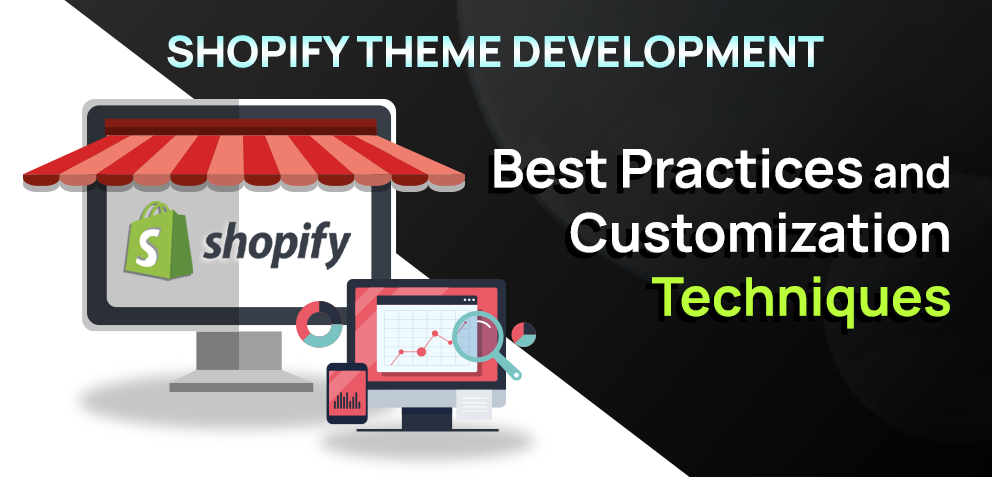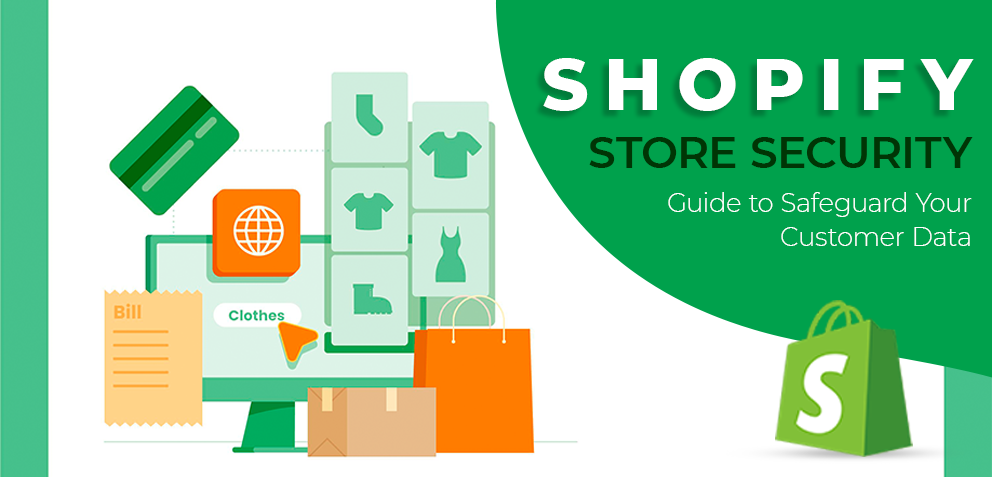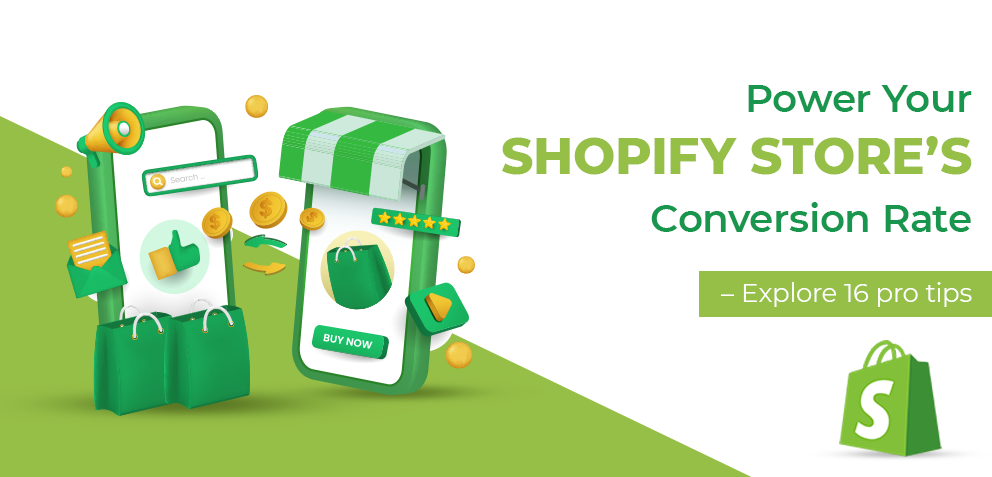Shopify vs. Shopify Plus: Which Is Right for Your Enterprise?
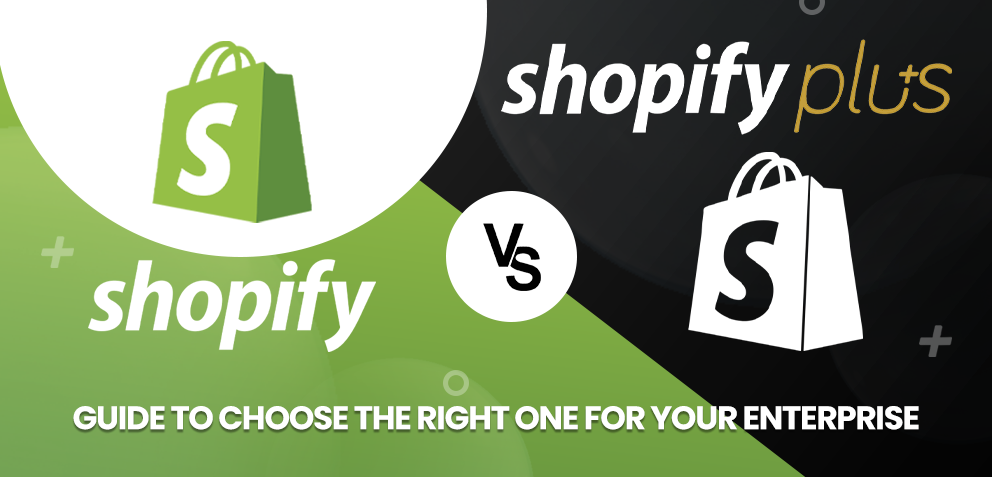
Table Of Contents
 Stay In-the-loop
Stay In-the-loop
Get fresh tech & marketing insights delivered right to your inbox.
Share this Article
Tags
Category
- .Net Developer
- Adtech
- Android App Development
- API
- App Store
- Artificial Intelligence
- Blockchain Development
- Chatbot Development
- CMS Development
- Cybersecurity
- Data Security
- Dedicated Developers
- Digital Marketing
- Ecommerce Development
- Edtech
- Fintech
- Flutter app development
- Full Stack Development
- Healthcare Tech
- Hybrid App Development
- iOS App Development
- IT Project Management
- JavaScript development
- Laravel Development
- Magento Development
- MEAN Stack Developer
- MERN Stack Developer
- Mobile App
- Mobile App Development
- Nodejs Development
- Progressive Web Application
- python development
- QA and testing
- Quality Engineering
- React Native
- SaaS
- SEO
- Shopify Development
- Software Development
- Software Outsourcing
- Staff Augmentation
- UI/UX Development
- Web analytics tools
- Wordpress Development
Planning to start your online business journey? The choice of an eCommerce platform is crucial—it’s the linchpin that can define your success. Enter the realm of Shopify and Shopify Plus, two powerhouse platforms tailored for businesses of all sizes. Serving as the backbone for numerous successful ventures, both offer robust Shopify development services, providing businesses with user-friendly interfaces and a diverse array of features.
The decision between these platforms is more than a technical detail; it’s a strategic move that can shape the trajectory of your eCommerce venture. Careful consideration of factors like transaction volume, global reach, and unique customization requirements will guide you toward the platform that aligns seamlessly with your business objectives.
In this article, we will explore Shopify vs. Shopify Plus–which reigns supreme. So, let’s get started!
Shopify vs. Shopify Plus: At A Glance
Of course, we are going to discuss things in detail, but here is a quick guide for you to understand the basic differences between these two.
In summary, Shopify is ideal for small to medium-sized businesses, while Shopify Plus is tailored for larger enterprises requiring advanced features, scalability, and customization with a higher budget.
Things to Compare while Choosing between Shopify vs. Shopify Plus
Features and Functionality
Shopify Plus is tailored for enterprise-level businesses, offering advanced features beyond Shopify. Notably, it provides customizable checkout experiences, enabling complex workflows and integrations.
With dedicated account management and priority support, Shopify Plus ensures swift problem resolution for large-scale operations. Its automation capabilities streamline tasks, enhancing efficiency. Multi-currency and multi-language support facilitates global expansion, crucial for enterprise outreach.
Additionally, robust API access empowers seamless integration with existing systems. Unique to Shopify Plus is the Launchpad feature, allowing orchestrated product releases and events. Moreover, advanced security features meet the stringent requirements of enterprise-level data protection.
In essence, Shopify Plus transcends standard eCommerce solutions, providing scalable and adaptable features vital for the intricate demands of large enterprises.
Scalability
Shopify Plus and Shopify offer scalable solutions for enterprise growth, with Shopify Plus specifically tailored for larger businesses. Shopify Plus provides advanced features, customizable scripts, and dedicated support to handle high-volume sales and complex operations. Its ability to handle large transaction volumes and extensive product catalogs makes it suitable for scaling enterprises. However, it comes with a higher price tag.
On the other hand, basic Shopify is more budget-friendly but might face limitations as businesses grow substantially. While it’s suitable for smaller enterprises, its scalability may be constrained in handling the complexity and demands of larger operations.
In summary, Shopify Plus is a robust choice for enterprises with ambitious growth plans, offering scalability and tailored features, whereas basic Shopify might require migration to Shopify Plus as business needs expand significantly. Explore advanced features like multi-channel selling in the Shopify development store for enterprise scalability.
ALSO READ: Magento Multi Store Setup Step-by-Step Guide 2024
Cost and Pricing Structures
Shopify and Shopify Plus cater to different business needs. While Shopify offers a scalable solution suitable for most small to medium-sized businesses, Shopify Plus targets larger enterprises with advanced requirements. The pricing for Shopify Plus is customized based on business specifics, involving a negotiated contract. This tailored approach allows flexibility for extensive features, customizations, and high transaction volumes. However, it may incur higher upfront costs and transaction fees.
Shopify, on the other hand, operates on a subscription model with tiered pricing. It provides a cost-effective solution for businesses with standard e-commerce needs. Assess your business scale, requirements, and potential growth when deciding between the two, ensuring that the features offered align with your goals to maximize value for money.
Customization and Flexibility
Shopify Plus and Shopify cater to different business scales, with Shopify Plus tailored for enterprise-level operations. Shopify Plus provides unparalleled customization, allowing businesses to mold the platform to their specific needs. It offers access to the underlying code, empowering enterprises to implement intricate modifications and create bespoke solutions. This level of flexibility is crucial for addressing the complex and dynamic requirements of large-scale businesses.
On the other hand, Shopify, while versatile, has limitations in terms of code access and extensive customization. It suits smaller businesses seeking simplicity. For enterprises demanding intricate adjustments, Shopify Plus stands out as the superior choice, offering the depth of customization necessary for managing the diverse facets of a large-scale operation.
Your Dream Store Awaits— Your Vision, Our Expertise!
Let's Build Your Shopify Store.
Performance and Speed
Shopify Plus and Shopify exhibit notable differences in performance metrics. Shopify Plus, tailored for high-volume enterprises, boasts superior page loading speeds, leveraging advanced infrastructure and dedicated resources. Its optimized architecture ensures minimal latency, enhancing user experience significantly. The platform’s reliability is reinforced by robust servers, mitigating downtime risks.
On the other hand, while Shopify caters to a broad audience, its performance may not match the precision of Shopify Plus in demanding scenarios. Page loading and speed might slightly lag during peak periods, affecting the overall user experience. However, for smaller businesses, Shopify offers a cost-effective solution with commendable performance.
In essence, Shopify Plus excels in delivering unparalleled performance for enterprises, prioritizing speed, reliability, and overall user satisfaction, while Shopify, though reliable, may face limitations under intense traffic conditions. Consider the specific needs of your business when choosing between the two platforms. Opt for Shopify Plus for robust performance and speed in enterprise-level Shopify website development.
Security Measures
Shopify Plus and Shopify employ robust security measures to fortify enterprise-level data and transactions. Employing advanced encryption protocols, both platforms ensure that sensitive information remains confidential during transmission. Their infrastructure features distributed denial-of-service (DDoS) protection, shielding against malicious attacks that could disrupt operations.
Continuous monitoring and threat detection mechanisms are in place, promptly identifying and addressing potential security threats. Additionally, both platforms adhere to industry-leading compliance standards, such as PCI DSS, validating their commitment to maintaining the highest security standards for financial transactions. Rigorous access controls and authentication protocols further bolster the protection of critical data. In tandem, these measures reflect Shopify Plus and Shopify’s unwavering dedication to providing a secure and trustworthy environment for enterprises to conduct their eCommerce operations seamlessly.
Read More: 16 Tips to Optimize Your Shopify Store’s Conversion Rate
Integration Capabilities
Shopify Plus and Shopify boast robust integration capabilities, seamlessly connecting with a plethora of third-party tools and services. These platforms support a wide array of integrations, spanning payment gateways, shipping solutions, marketing automation, and customer relationship management (CRM) systems. With their API flexibility and app ecosystem, businesses can effortlessly integrate with popular services like Salesforce, Mailchimp, and Zendesk.
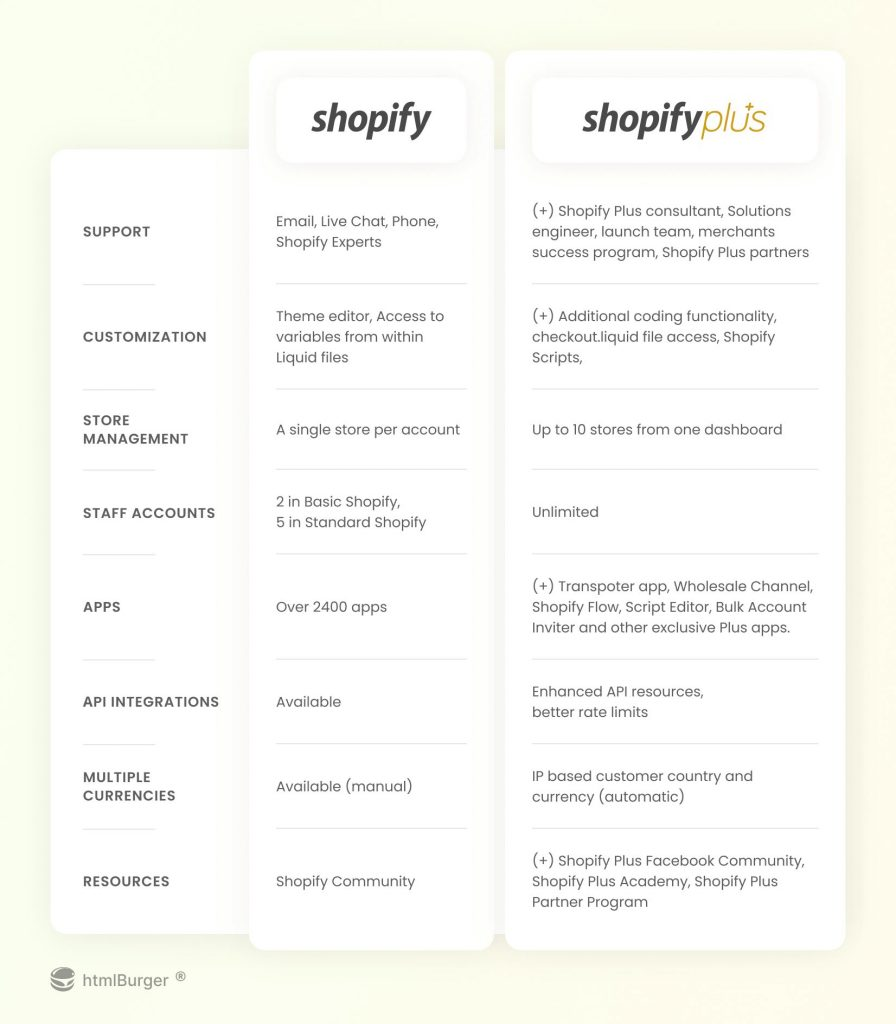
Furthermore, Shopify’s App Store offers a vast repository of specialized apps, empowering merchants to tailor their stores to specific needs. The versatility of these integrations enhances efficiency, scalability, and provides businesses with the agility needed in the dynamic e-commerce landscape.
Whether optimizing operations or elevating marketing strategies, the integration capabilities of Shopify Plus and Shopify make them formidable choices for enterprises seeking seamless connectivity with diverse business tools.
Support and Service Levels
Shopify Plus demonstrates exemplary customer support for larger enterprises, boasting dedicated account management, priority support, and personalized onboarding. Its 24/7 priority support ensures swift resolution of critical issues. The platform’s enterprise-grade features and scalability align seamlessly with the complex demands of large businesses.
On the other hand, standard Shopify, while robust, may lack some advanced features crucial for sizable enterprises. Customer support is responsive, yet the priority given to Shopify Plus clients sets it apart. Shopify’s broad appeal lies in its user-friendly approach, but for enterprises requiring tailored solutions, Shopify Plus emerges as the superior choice.
In essence, Shopify Plus excels in delivering a premium, tailored experience for larger enterprises, combining robust technology with top-tier customer support. Explore Shopify web development support and service levels for enterprise solutions.
Ready to Launch Your Shopify Store?
Hire Our Skilled Developers & Get Started!
Hire Now!
User Interface and Experience
Shopify Plus and Shopify boast user interfaces tailored for enterprise users, prioritizing efficiency and scalability. Shopify Plus, designed explicitly for large-scale businesses, offers advanced customization, empowering enterprises to tailor workflows to their unique needs effortlessly. Its user-friendly interface simplifies complex tasks, ensuring a seamless experience for managing extensive product catalogs and handling high transaction volumes.
On the other hand, Shopify, while catering to a broader audience, doesn’t compromise on user experience for enterprise users. Its intuitive design and straightforward navigation make it easy for businesses of all sizes to set up, manage, and grow their online presence efficiently.
Both platforms prioritize user-friendly interfaces, with Shopify Plus elevating the experience through enterprise-specific features, while Shopify maintains accessibility and simplicity for a diverse user base.
Related Read: 15 Tips to Protect Customer Data with Shopify Development
Which One is Better — Shopify or Shopify Plus?
Which platform, Shopify or Shopify Plus, is better for you? Your unique needs and objectives will determine the response. Shopify might be a terrific choice if you’re a startup small- or medium-sized business. It has a lot of functions and is simple to use.
Shopify Plus might be a better option if you’re a large company with complicated needs. It offers more sophisticated features, such as priority support, custom themes, and API access.
Ultimately, thoroughly evaluating your project objectives and budget will help you determine the ideal platform.
At Magicminds, we’re experts in Shopify development. We can help you choose the right platform for your business and build a custom Shopify store that meets your needs.
Contact us today to learn more about our Shopify development services.
Planning to start your online business journey? The choice of an eCommerce platform is crucial—it’s the linchpin that can define your success. Enter the realm of Shopify and Shopify Plus, two powerhouse platforms tailored for businesses of all sizes. Serving as the backbone for numerous successful ventures, both offer robust Shopify development services, providing businesses with user-friendly interfaces and a diverse array of features. The decision between these platforms is more than a technical detail; it’s a strategic move that can shape the trajectory of your eCommerce venture. Careful consideration of factors like transaction volume, global reach, and unique customization requirements will guide you toward the platform that aligns seamlessly with your business objectives. In this article, we will explore Shopify vs. Shopify Plus–which reigns supreme. So, let’s get started!
Shopify vs. Shopify Plus: At A Glance
Of course, we are going to discuss things in detail, but here is a quick guide for you to understand the basic differences between these two.
In summary, Shopify is ideal for small to medium-sized businesses, while Shopify Plus is tailored for larger enterprises requiring advanced features, scalability, and customization with a higher budget.
Things to Compare while Choosing between Shopify vs. Shopify Plus
Features and Functionality
Shopify Plus is tailored for enterprise-level businesses, offering advanced features beyond Shopify. Notably, it provides customizable checkout experiences, enabling complex workflows and integrations.
With dedicated account management and priority support, Shopify Plus ensures swift problem resolution for large-scale operations. Its automation capabilities streamline tasks, enhancing efficiency. Multi-currency and multi-language support facilitates global expansion, crucial for enterprise outreach.
Additionally, robust API access empowers seamless integration with existing systems. Unique to Shopify Plus is the Launchpad feature, allowing orchestrated product releases and events. Moreover, advanced security features meet the stringent requirements of enterprise-level data protection.
In essence, Shopify Plus transcends standard eCommerce solutions, providing scalable and adaptable features vital for the intricate demands of large enterprises.
Scalability
Shopify Plus and Shopify offer scalable solutions for enterprise growth, with Shopify Plus specifically tailored for larger businesses. Shopify Plus provides advanced features, customizable scripts, and dedicated support to handle high-volume sales and complex operations. Its ability to handle large transaction volumes and extensive product catalogs makes it suitable for scaling enterprises. However, it comes with a higher price tag.
On the other hand, basic Shopify is more budget-friendly but might face limitations as businesses grow substantially. While it’s suitable for smaller enterprises, its scalability may be constrained in handling the complexity and demands of larger operations.
In summary, Shopify Plus is a robust choice for enterprises with ambitious growth plans, offering scalability and tailored features, whereas basic Shopify might require migration to Shopify Plus as business needs expand significantly. Explore advanced features like multi-channel selling in the Shopify development store for enterprise scalability.
ALSO READ: Magento Multi Store Setup Step-by-Step Guide 2024
Cost and Pricing Structures
Shopify and Shopify Plus cater to different business needs. While Shopify offers a scalable solution suitable for most small to medium-sized businesses, Shopify Plus targets larger enterprises with advanced requirements. The pricing for Shopify Plus is customized based on business specifics, involving a negotiated contract. This tailored approach allows flexibility for extensive features, customizations, and high transaction volumes. However, it may incur higher upfront costs and transaction fees.
Shopify, on the other hand, operates on a subscription model with tiered pricing. It provides a cost-effective solution for businesses with standard e-commerce needs. Assess your business scale, requirements, and potential growth when deciding between the two, ensuring that the features offered align with your goals to maximize value for money.
Customization and Flexibility
Shopify Plus and Shopify cater to different business scales, with Shopify Plus tailored for enterprise-level operations. Shopify Plus provides unparalleled customization, allowing businesses to mold the platform to their specific needs. It offers access to the underlying code, empowering enterprises to implement intricate modifications and create bespoke solutions. This level of flexibility is crucial for addressing the complex and dynamic requirements of large-scale businesses.
On the other hand, Shopify, while versatile, has limitations in terms of code access and extensive customization. It suits smaller businesses seeking simplicity. For enterprises demanding intricate adjustments, Shopify Plus stands out as the superior choice, offering the depth of customization necessary for managing the diverse facets of a large-scale operation.
Performance and Speed
Shopify Plus and Shopify exhibit notable differences in performance metrics. Shopify Plus, tailored for high-volume enterprises, boasts superior page loading speeds, leveraging advanced infrastructure and dedicated resources. Its optimized architecture ensures minimal latency, enhancing user experience significantly. The platform’s reliability is reinforced by robust servers, mitigating downtime risks.
On the other hand, while Shopify caters to a broad audience, its performance may not match the precision of Shopify Plus in demanding scenarios. Page loading and speed might slightly lag during peak periods, affecting the overall user experience. However, for smaller businesses, Shopify offers a cost-effective solution with commendable performance.
In essence, Shopify Plus excels in delivering unparalleled performance for enterprises, prioritizing speed, reliability, and overall user satisfaction, while Shopify, though reliable, may face limitations under intense traffic conditions. Consider the specific needs of your business when choosing between the two platforms. Opt for Shopify Plus for robust performance and speed in enterprise-level Shopify website development.
Security Measures
Shopify Plus and Shopify employ robust security measures to fortify enterprise-level data and transactions. Employing advanced encryption protocols, both platforms ensure that sensitive information remains confidential during transmission. Their infrastructure features distributed denial-of-service (DDoS) protection, shielding against malicious attacks that could disrupt operations.
Continuous monitoring and threat detection mechanisms are in place, promptly identifying and addressing potential security threats. Additionally, both platforms adhere to industry-leading compliance standards, such as PCI DSS, validating their commitment to maintaining the highest security standards for financial transactions. Rigorous access controls and authentication protocols further bolster the protection of critical data. In tandem, these measures reflect Shopify Plus and Shopify’s unwavering dedication to providing a secure and trustworthy environment for enterprises to conduct their eCommerce operations seamlessly.
Read More: 16 Tips to Optimize Your Shopify Store’s Conversion Rate
Integration Capabilities
Shopify Plus and Shopify boast robust integration capabilities, seamlessly connecting with a plethora of third-party tools and services. These platforms support a wide array of integrations, spanning payment gateways, shipping solutions, marketing automation, and customer relationship management (CRM) systems. With their API flexibility and app ecosystem, businesses can effortlessly integrate with popular services like Salesforce, Mailchimp, and Zendesk.

Furthermore, Shopify’s App Store offers a vast repository of specialized apps, empowering merchants to tailor their stores to specific needs. The versatility of these integrations enhances efficiency, scalability, and provides businesses with the agility needed in the dynamic e-commerce landscape.
Whether optimizing operations or elevating marketing strategies, the integration capabilities of Shopify Plus and Shopify make them formidable choices for enterprises seeking seamless connectivity with diverse business tools.
Support and Service Levels
Shopify Plus demonstrates exemplary customer support for larger enterprises, boasting dedicated account management, priority support, and personalized onboarding. Its 24/7 priority support ensures swift resolution of critical issues. The platform’s enterprise-grade features and scalability align seamlessly with the complex demands of large businesses.
On the other hand, standard Shopify, while robust, may lack some advanced features crucial for sizable enterprises. Customer support is responsive, yet the priority given to Shopify Plus clients sets it apart. Shopify’s broad appeal lies in its user-friendly approach, but for enterprises requiring tailored solutions, Shopify Plus emerges as the superior choice.
In essence, Shopify Plus excels in delivering a premium, tailored experience for larger enterprises, combining robust technology with top-tier customer support. Explore Shopify web development support and service levels for enterprise solutions.
User Interface and Experience
Shopify Plus and Shopify boast user interfaces tailored for enterprise users, prioritizing efficiency and scalability. Shopify Plus, designed explicitly for large-scale businesses, offers advanced customization, empowering enterprises to tailor workflows to their unique needs effortlessly. Its user-friendly interface simplifies complex tasks, ensuring a seamless experience for managing extensive product catalogs and handling high transaction volumes.
On the other hand, Shopify, while catering to a broader audience, doesn’t compromise on user experience for enterprise users. Its intuitive design and straightforward navigation make it easy for businesses of all sizes to set up, manage, and grow their online presence efficiently.
Both platforms prioritize user-friendly interfaces, with Shopify Plus elevating the experience through enterprise-specific features, while Shopify maintains accessibility and simplicity for a diverse user base.
Related Read: 15 Tips to Protect Customer Data with Shopify Development
Which One is Better — Shopify or Shopify Plus?
Which platform, Shopify or Shopify Plus, is better for you? Your unique needs and objectives will determine the response. Shopify might be a terrific choice if you’re a startup small- or medium-sized business. It has a lot of functions and is simple to use.
Shopify Plus might be a better option if you’re a large company with complicated needs. It offers more sophisticated features, such as priority support, custom themes, and API access.
Ultimately, thoroughly evaluating your project objectives and budget will help you determine the ideal platform.
At Magicminds, we’re experts in Shopify development. We can help you choose the right platform for your business and build a custom Shopify store that meets your needs.
Contact us today to learn more about our Shopify development services.
